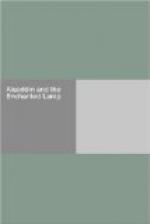When [FN#398] the queen heard the princess’s story, she said to her, “O my daughter, beware of [FN#399] telling this tale before any, lest they [FN#400] say, ’Verily the Sultan’s daughter hath lost her wits.’ Marry, thou diddest well in that thou acquaintedst not thy father with this; and beware, yea [again I say,] beware, O my daughter, of telling him thereof.” “O my mother,” rejoined the Lady Bedrulbudour, “indeed, I bespoke thee in sober earnest and have not lost my wits; nay, this is what happened to me, and an thou believe it not from me, ask my bridegroom.” Quoth the queen, “Rise, O my daughter, and put away these illusions from thy thought; nay, don thy clothes and see the rejoicing that is toward in the town on thine account and the festivities that they celebrate in the kingdom for thy sake and hear the drums and the singing and look upon the decorations, all in honour of thy nuptials, O my daughter.” Accordingly, she summoned the tirewomen, who dressed the Lady Bedrulbudour and busked her; whilst the Queen went in to the Sultan and told him that there had that night betided the princess a dream and illusions, saying, “BIame her not for her failure to answer thee.” Moreover, she sent for the Vizier’s son privily and questioned him of the affair, whether the Lady Bedrulbudour’s speech was true or not; but he, of his fear to lose his bride, lest she should go from his hand, said to her, “O my lady, I know nothing of that which thou sayest;” wherefore the queen was certified that there had betided her daughter illusions and a dream.
The wedding rejoicings continued all that day, with dancing-women and singing-women, and all the instruments of mirth and minstrelsy were smitten, whilst the queen and the Vizier and his son were exceeding assiduous in keeping up the festivities, so the Lady Bedrulbudour should rejoice and her chagrin be dispelled; nay, they left nought that day of that which exciteth unto liesse but they did it before her, so she should leave what was in her mind and be cheered. But all this had no effect on her and she was silent and thoughtful and confounded at that which had befallen her that night. True, the Vizier’s son had fared worse than she, for that he was couched in the draught-house; but he belied [FN#401] the matter and put away that tribulation from his thought, of his fear lest he should lose his bride and his rank, [FN#402] more by token that all the folk envied him his lot, for the much increase of honour it brought him, as also for the exceeding beauty and loveliness of the Lady Bedrulbudour.
As for Alaeddin, he went out that day and saw the rejoicings toward in the city and the palace and fell a-laughing, especially when he heard the folk speak of the honour which had betided the Vizier’s son and the greatness of his good luck, in that he was become the Sultan’s son-in-law, and the exceeding pomp used in his marriage and bridal festivities; and he said in himself, “Ye know not, good simple




